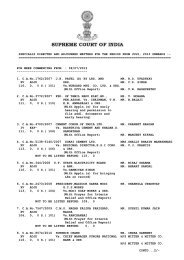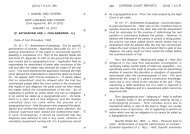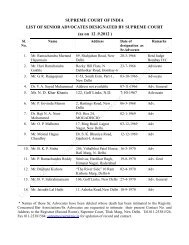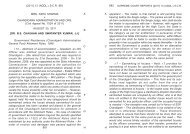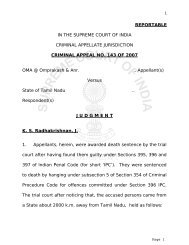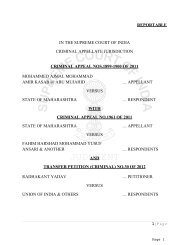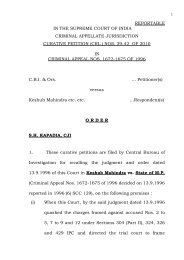My Dream of An Ideal Justice Dispensation System
My Dream of An Ideal Justice Dispensation System
My Dream of An Ideal Justice Dispensation System
You also want an ePaper? Increase the reach of your titles
YUMPU automatically turns print PDFs into web optimized ePapers that Google loves.
prompt and inexpensive service to its consumers. If people loose faith inthe justice dispensed to them, the entire democratic setup may crumbledown. To retain the trust and confidence <strong>of</strong> people in the responsivenessand ability <strong>of</strong> the system, it should be capable <strong>of</strong> delivering quick andinexpensive justice.No one can progress unless he dreams. No one can seek reformsunless he imagines. But, there cannot be any progress in dreams andreforms in imagination. Self-realisation, self-criticism and self-judgment arethe three angles <strong>of</strong> any reforms. To reform, one needs a scientific theorywith an applied science. One, without other, is infirm. We have philosophyand ideals on the reform <strong>of</strong> judicial system in abundant measure, but hardlyany scientifically analysed proposals with a practical outlay. The need <strong>of</strong>the hour is to identify the shortcomings and remove them to the extent it ispossible.<strong>An</strong> <strong>Ideal</strong> <strong>Justice</strong> <strong>Dispensation</strong> <strong>System</strong> should necessarily have thefollowing attributes:1. Speedy and affordable quality justice;2. Independent judiciary;3. Ethics and honesty in governance;4. Social relevance, dynamism and pragmatism.6
Many a times, many suggestions by many, including me, have beenmade at different forums. The need is to act upon them swiftly anddecisively.1. Speedy and Affordable Quality <strong>Justice</strong>:When we talk <strong>of</strong> ‘delay’ in the context <strong>of</strong> justice, it denotes the timeconsumed in the disposal <strong>of</strong> case, in excess <strong>of</strong> the time within which a casecan be reasonably expected to be decided by the Court. <strong>An</strong> expected lifespan <strong>of</strong> a case is an inherent part <strong>of</strong> the system. No one expects a case tobe decided overnight. However, difficulty arises when the actual time takenfor disposal <strong>of</strong> the case far exceeds its expected life span and that is whenwe say there is delay in dispensation <strong>of</strong> justice.Delay in disposal <strong>of</strong> cases not only creates disillusionment amongstthe litigants, but also undermines the vary capability <strong>of</strong> the system to impartjustice in an efficient and effective manner. Long delay also has the effect<strong>of</strong> defeating justice in quite a number <strong>of</strong> cases.The problem is much more acute in criminal cases, as compared tocivil cases. Speedy trial <strong>of</strong> a criminal case considered to be an essentialfeature <strong>of</strong> right <strong>of</strong> a fair trial has remained a distant reality. A procedurewhich does not provide trial and disposal within a reasonable period cannotbe said to be just, fair and reasonable. If the accused is acquitted aftersuch long delay one can imagine the unnecessary suffering he was7
cases in a scientific manner, more thrust on ADR Methods including LokAdalats, and modernization & computerization <strong>of</strong> courts.Video conferencing is a convenient, secure and less expensiveoption, for recording evidence <strong>of</strong> the witnesses who are not local residentsor who are afraid <strong>of</strong> giving evidence in open court, particularly in trial <strong>of</strong>gangsters and hardened criminals. This is in addition to savings <strong>of</strong> timeand expenses <strong>of</strong> traveling. Recently, Code <strong>of</strong> Criminal Procedure hasbeen amended in some States to allow use <strong>of</strong> Video Conferencing for thepurpose <strong>of</strong> giving remand <strong>of</strong> accused persons thereby eliminating need fortheir physical presence before the Magistrate.We need to makeextensive use <strong>of</strong> this facility.Training <strong>of</strong> Judges and Judicial Staff:Regular training and orientation sharpens the adjudicatory skills <strong>of</strong>Judicial Officers. If judgments at the level <strong>of</strong> trial courts are <strong>of</strong> a highquality, the number <strong>of</strong> revisions and appeals may also get reduced. If theJudge is not competent he will take longer time to understand the facts andthe law and to decide the case. The training needs to include Court and9
Case Management besides methods to improve their skills in hearingcases, taking decisions and writing judgments.Carrying out <strong>of</strong> judicial reforms and implementation <strong>of</strong> new initiativesrequire participation <strong>of</strong> and concerted efforts from not only Judges but als<strong>of</strong>rom Court personnel, who manage the system.Discretionary Prosecution:It is difficult to enforce the formal system <strong>of</strong> charge and adjudicationin respect <strong>of</strong> all the <strong>of</strong>fences irrespective <strong>of</strong> their nature, implication andmagnitude. There are simply too many <strong>of</strong>fences, too many <strong>of</strong>fenders andtoo few resources to deal with them all. In some countries, including U.K.,the principle <strong>of</strong> discretionary prosecution has replaced the principle <strong>of</strong>obligatory prosecution.A case is sent for trial only if the prosecutingagency is <strong>of</strong> the opinion that the prosecution <strong>of</strong> the accused would be inpublic interest. We can consider and opt the same principle with suchmodifications as may be deemed appropriate in our circumstances.Legal Assistance:A large majority <strong>of</strong> our people still live below the poverty line and arehardly able to afford two square meals and a shelter on their head. Itwould be unrealistic to expect them to afford the services <strong>of</strong> a competentadvocate. Efforts have been made by governments from time to time to10
address the issue <strong>of</strong> granting legal aid to the poor but, enough has notbeen done and the system requires further augmentation andstrengthening, particularly on giving such people services <strong>of</strong> good andcompetent lawyers and not just lawyers.Unless the advocates provided(by legal services authority) are competent and hard working, no usefulpurpose is served by making their services available to the poor litigants.Legal Service Authorities have to take suitable steps to ensure that theyempanel only reputed counsel <strong>of</strong> proven ability and integrity, in whom thepoor litigants may repose trust. There is reluctance on the part <strong>of</strong> seniorcounsel to come forward, to provide legal aid to the needy persons. Theyhave to be persuaded to acknowledge their social obligations and providetheir service to the weaker sections, without expecting any remunerationeither from them or from the Legal Service Authorities. In developedcountries viz. United Kingdom, the Government maintains a panel <strong>of</strong> verycompetent and experienced advocates for providing legal aid to thedefendants in criminal cases and pays adequate remuneration to them. Inour country, the State cannot afford to pay the fee being presentlycommanded by successful Advocates.It must nevertheless payreasonable compensation, so as to attract talented and reasonablyexperienced advocates to legal aid panels. Legal services authoritiesshould ensure that such panels are manned only by service orientedadvocates and are not used for the purpose <strong>of</strong> dolling out favours to thekiths and kins <strong>of</strong> the powers that be or to advocates who do not want to11
work hard and join such panels merely for the purpose <strong>of</strong> earning theirlivelihood.Legal Literacy:The benefits <strong>of</strong> social welfare legislations have not been able toachieve their intended purpose due to ignorance on the part <strong>of</strong> the targetcitizens about the availability <strong>of</strong> various welfare schemes initiated by thegovernments from time to time. Legal literacy will make the citizens aware<strong>of</strong> their legal rights and obligations, including their right to receive legal aidfrom the State. The services <strong>of</strong> law students can be effectively utilized inspreading legal literacy and facilitating negotiated settlement <strong>of</strong> disputes.Legal aid camps are an effective tool for spreading legal literacy,encouraging people to resolve their disputes amicably and availing thebenefit <strong>of</strong> legal aid, wherever required by them. I will urge all the students<strong>of</strong> this illustrious law college to devote part <strong>of</strong> their time in attending legalaid camps and spreading legal literacy. Not only will they be able to servethe weaker sections <strong>of</strong> the society, they will also prove to be better lawyersand better human beings.2. Independent Judiciary:<strong>An</strong> independent judiciary is the backbone <strong>of</strong> a good judicialgovernance. Rule <strong>of</strong> Law and judicial review are the basic features <strong>of</strong>Indian constitution and independence <strong>of</strong> judiciary is an essential attribute <strong>of</strong>12
Rule <strong>of</strong> Law. Administration <strong>of</strong> justice requires judiciary committed to theconstitution and law <strong>of</strong> the land.Judiciary must, therefore, be free frompressures or influence from any quarter. The oath which Judge takesbefore he enters upon his <strong>of</strong>fice, requires him to perform the duties <strong>of</strong> his<strong>of</strong>fice without fear or favour, affection or ill-will. This solemn affirmation isthe bedrock <strong>of</strong> the faith <strong>of</strong> litigants in the judiciary. The ultimate saviour <strong>of</strong>an independent judiciary is a brave and fearless judge who truthfullydischarges the duties <strong>of</strong> his <strong>of</strong>fice without in any manner being influencedfrom any quarter.A judiciary manned by judges with vision, wisdom andcompassion can do more justice and the welfare to the underprivilegedthan all the laws and policies we can think <strong>of</strong>.judge as:Sir Harry Gibbs, Chief <strong>Justice</strong> <strong>of</strong> Australia defined an independent“That Judge who has nothing to hope for, nothing t<strong>of</strong>ear, in respect <strong>of</strong> anything done in the performance <strong>of</strong>his judicial functions, that Judge who is ablesuccessfully to resist pressures <strong>of</strong> any kind.”The concept <strong>of</strong> judicial independence, takes within its sweep,independent from any pressure or prejudice. It has many dimensionsincluding fearlessness <strong>of</strong> other centres, whether economic or political andfreedom from prejudice acquired and nourished by the class by which thejudge belongs. The judiciary stands between the citizen and the state as a13
ulwark against executive pressure, excesses and misuse <strong>of</strong> power by theexecutive. It is, therefore, absolutely essential that it should be free fromexecutive pressure or influence and our constitution contains elaborateprovisions to secure this requirement.3. Ethics and Honesty in Governance:Integrity, impartiality and fairness <strong>of</strong> judiciary are the main sources <strong>of</strong>public acceptance <strong>of</strong> its authority. The very existence <strong>of</strong> judicial institutionsdepends upon the judges, who constitute the system. They should neverforget that they hold the <strong>of</strong>fice <strong>of</strong> a judge as a public trust and therefore,should continuously strive to retain the confidence reposed in them by thepeople. No system <strong>of</strong> justice can rise above the ethics <strong>of</strong> those whoadminister it. Lord Denning has stated “when a judge sits to try the casehe himself is on trial before his fellow countrymen. It is on his behaviourthat they will form their opinion <strong>of</strong> our system <strong>of</strong> justice.”Judges do not have the power <strong>of</strong> sword or purse. They only havethe moral authority based upon the confidence <strong>of</strong> the public in them and solong as they maintain that authority their orders will be respected andcomplied.It is necessary to maintain highest standards <strong>of</strong> integrity,rectitude and impartiality, so as to maintain that confidence.A Judge should be conscientious, just, impartial, indifferent toprivate, political or partisan influences, indifferent to public praise and14
fearless <strong>of</strong> public clamour. He is expected to administer justice accordingto law and not allow other affairs <strong>of</strong> his private interest to interfere with thedue performance <strong>of</strong> his duty, nor should he administer the <strong>of</strong>fice for thepurpose <strong>of</strong> advancing his personal aims or increasing his personalpopularity.Our courts have, to a very large extent, justified the confidencereposed in them by the common man. Unlike members <strong>of</strong> other services,only occasionally complaints are heard against the members <strong>of</strong> judiciary.At the same time, it cannot be denied that stray complaints have startedemerging and showing their ugly face.The instances <strong>of</strong> corruption,wherever they surface, have to be ruthlessly curbed with a firm hand.AJudge, who is prone or susceptible to corruption cannot have any place inthe system, which should not hesitate in weeding out the deadwood, thecorrupt and the insolent.The High Courts should meaningfully and effectively exercise powersconferred upon them by Article 235 <strong>of</strong> the Constitution so as to maintainhighest level <strong>of</strong> integrity, honesty and fairness.Action against erringjudges should be prompt and effective. I am happy to note that by andlarge wherever such instances have come to the notice <strong>of</strong> the High Courts,they have not hesitated in taking a firm stand and ruthlessly curbing suchtendencies.15
Judicial restraint and discipline are also as necessary to the orderlyadministration <strong>of</strong> justice as they are to the effectiveness <strong>of</strong> the army. Theduty <strong>of</strong> restraint is humility. This quality in decision making is as muchnecessary for judges to command respect as to protect the independence<strong>of</strong> the judiciary.A judge ought to be bestowed with the sense <strong>of</strong> completedetachment and humility. A Judge should never be heard claiming withegotism that a particular judgment was written by him or a particularsentence or decree was passed by him. He should be polite, detached andhumble, active in body, but detached in mind.4. Social Relevance, Dynamism and Pragmatism:<strong>An</strong>other aspect to be highlighted is the Latin maxim Boni Judicis estampliare jurisdictionem, that law must keep pace with society to retain itsrelevance. It must continue to govern our justice delivery system. If thesociety moves but the law remains static, it shall be good for neither <strong>of</strong>them.More than fifteen years back, the Supreme Court in Delhi JudicialService Association v. State <strong>of</strong> Gujarat, said: “… … …In interpretingthe Constitution, regard must be had to the social, economic and politicalchanges, need <strong>of</strong> the community and the independence <strong>of</strong> judiciary. The16
court cannot be a helpless spectator bound by precedents <strong>of</strong> colonial days,which have lost relevance. … … …”Lord Denning has beautifully said “every new decision or every newsituation is a development <strong>of</strong> law. Law does not stand still. It movescontinually. Once this is recognized, then the task <strong>of</strong> the judge is put on ahigher plane. He must consciously seek to mould the law so as to servethe needs <strong>of</strong> the time. He must not be a mere mechanic, a mere workingmasion laying brick on brick, without thought to the overall design. Hemust be an architect thinking <strong>of</strong> the structure as a whole building for thesociety, a system <strong>of</strong> law, which is strong, durable and just. It is on his workthe civilized society depends.”Legal Education:Students are my architects and, therefore, I now want to addressmain aspects that I think one should focus on during legal education at theesteemed institution like this. Your legal education will help determine howskilled and what type <strong>of</strong> a lawyer you become. I think discussing legaleducation is especially pertinent to today’s topic because what educationlaw students receive will also deeply shape how justice will be dispensed inthis country in the years to come. With that in mind, there are five criticalcomponents to legal education that I think you should consider. First, workto get a well-rounded, inter-disciplinary education.17
You should embrace the inter-disciplinary elements <strong>of</strong> youreducation to get a well-rounded perspective on the world.Whetherthrough your classes or your own personal efforts, learn about history,philosophy, science, literature and art. These disciplines will serve you wellas a lawyer. The law is grounded in history and philosophy. Many <strong>of</strong> thebiggest controversies in society today involve science. Literature and artwill help you learn that the world can be understood in many different ways.<strong>An</strong> inter-disciplinary, well-rounded education allows you to prepare forwhatever you may confront in life whether in the law or outside <strong>of</strong> it.Second, think about theory while you are here. When you read acase don’t just examine the facts and the holding, but reflect upon thetheory and context behind the decision. If a particular issue strikes youresearch it further and write about it. Consider submitting your work to thelaw review. There are still many areas <strong>of</strong> the law that need to be more fullyexplored by scholars and students like you. Moreover, when you study thetheory behind the law you are learning principles you can apply to anycase.Third, learn about law and globalization while at law college. DeanHarold Koh <strong>of</strong> Yale Law School asks students to consider three aspects <strong>of</strong>law and globalization: the law as globalization, the law <strong>of</strong> globalization, andthe law in globalization.[ Harold Koh, “Dean’s Welcoming Speech 2006”18
Aug. 30, 2006] Let’s examine each <strong>of</strong> these briefly in turn to get a sense <strong>of</strong>this relatively new field.The law as globalization.This means that the spread <strong>of</strong> lawworldwide is a feature <strong>of</strong> globalization just like global communication orglobal culture.Of course, the sharing <strong>of</strong> legal knowledge betweencountries is not new. India has looked abroad for inspiration for its lawsince independence.The Indian Constitution’s political structure wasinfluenced by Great Britain, the Fundamental Rights by the United States,the Directive Principles by Ireland, and its federalism by Canada andAustralia. When drafters <strong>of</strong> constitutions in other countries undertook theirtask, they too looked to other countries for inspiration. Recently, thedrafters <strong>of</strong> the South African Constitution deliberately cast their gaze toconstitutions across the world for inspiration for their own constitution.Similarly, courts <strong>of</strong> different nations look to the decisions <strong>of</strong> othercourts for insight or guidance to a topic before them. This too is not new.What is new is that the decisions <strong>of</strong> courts from around the world are nowjust a mouse click away.This increased interconnectivity bringsadvantages and disadvantages. It is an advantage because we can learnfrom the experiences <strong>of</strong> other countries and when applicable have ourdiscussions shaped by the reasoning <strong>of</strong> courts in similar situations.However, there are also potential pitfalls. There can be literally hundreds<strong>of</strong> decisions on any given topic from other countries around the world. We19
can become overwhelmed by the shear immensity <strong>of</strong> information we arepresented with. Furthermore, many <strong>of</strong> the experiences <strong>of</strong> other countriesmay be only partly relevant or not relevant at all.It is learning todiscriminate amongst all the information presented in a globalized worldthat makes a good lawyer.Let’s now turn to the law <strong>of</strong> globalization.This means thatglobalization comes with its own unique set <strong>of</strong> laws and legal institutions,whether it is human rights treaties or WTO trade law. <strong>An</strong> increasingnumber <strong>of</strong> cases involve or are informed by this law <strong>of</strong> globalization. It isimperative that we understand and shape this emerging law.This brings us to the law in globalization. Here, the word “law” isused normatively, in that law is not just a set <strong>of</strong> rules – dictators and tyrantscan impose those through force – but instead law has a moral authority,law brings justice. We must understand how we can use the law to bluntthe harsh edges and control the dark sides <strong>of</strong> globalization. As long aspeople have humanity so must their law, this is no different in a globalizedworld.Turning from globalization and the law, let me discuss a fourthaspect. I think that before you go out <strong>of</strong> the law college, you should engagein public service as part <strong>of</strong> legal education while you are here. There are anumber <strong>of</strong> ways <strong>of</strong> doing this. One is working at the legal aid clinic at the20
Government Law College. Such work not only trains you in skills you willneed to be a successful lawyer, but also allows you to give back to thecommunity around you. You will discover challenges in public servicework. You will also develop a greater understanding <strong>of</strong> the perspectives <strong>of</strong>those you help. That greater understanding will in turn increase yourdesire to help.This brings me to the fifth and last aspect <strong>of</strong> your legal education.Reflect upon your values while at law college. What will you stand for?What will you fight for?Gandhi and Nehru were trained in the law, as were many <strong>of</strong> ourother independence leaders including Dr. Ambedkar, a distinguishedalumni <strong>of</strong> this school. So were great leaders for freedom and equality incountries around the world. The challenges our country faces today maybe different than those it faced at the time <strong>of</strong> our founding fathers, but theneed for lawyers committed to the public service is no less, need for valuesis no less and the need to improve the reputation <strong>of</strong> lawyers as a class, isno less. Final judgment is yours.ConclusionIt is important that we are asked to dream <strong>of</strong> utopias. To ask not justwhat is, or what seems possible, but what could be. In the first part <strong>of</strong> thislecture I outlined some <strong>of</strong> the challenges facing justice dispensation in our21
country, and hinted to some answers. I limited my grand pronouncementsabout the future and instead chose to spend the second half <strong>of</strong> my talk ondiscussing legal education. I did so because lawyers will be importantpractitioners and in many ways the architects <strong>of</strong> justice dispensation in thefuture. If we have good lawyers – by which I mean well-rounded lawyers,grounded in theory and research, adaptive to a changing world, committedto the public service, and motivated by strong values – then we havereason for great hope. Whatever utopias we strive to reach that journeybegins here. That is why I am so thankful that I was asked to come todayto celebrate the 150 th anniversary <strong>of</strong> this illustrious institution that hasalready produced so many distinguished alumni.The strength <strong>of</strong>institutions like the Government Law College and the potential <strong>of</strong> studentslike yourself gives us confidence that the future <strong>of</strong> justice dispensation inthis country is bright.Let me end by acknowledging that it is difficult to achieve theperfection but one can always strive to excel and if one continues to walkon this path tirelessly, many, if not all, problems could be overcome. Manythanks and best <strong>of</strong> luck.************22






